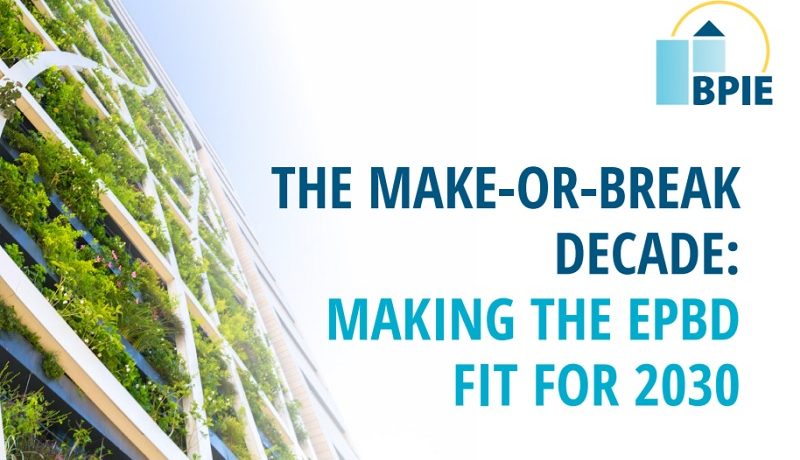EPBD revision marks ‘make-or-break’ opportunity for climate-neutral buildings. The keystone of European buildings legislation, the Energy Performance of Buildings Directive (EPBD), will be opened for revision by the end of 2021. This new policy briefing highlights a make-or-break opportunity to make the EPBD ‘fit for 2030’, ensuring that the buildings sector contributes significantly to the overall EU-wide target of more than halving emissions by 2030, and crucially, that it is fit to respond to the climate emergency.
The EU must now deliver on announced targets by taking bold actions and showing results
The ambition of the EPBD revision should go beyond simply ‘aligning’ with the Renovation Wave, since the latter was published before the new 2030 climate target of reducing greenhouse gas (GHG) emissions by at least 55%, was agreed. The revision should be comprehensive and not take a ‘cherry-picking’ approach to legislative revision.
Crucially, it must ensure the buildings sector will contribute to the achievement of the updated 2030 climate target; and second, to make the EPBD a milestone towards reaching climate-neutrality by 2050.
This means reaching an annual 3% deep renovation rate and a 60% reduction in GHG emissions by 2030. It should do this while taking a people-centered approach that supports energy-poor, low- and middle-income households; the integration of whole-life carbon considerations next to the Energy Efficiency First principle; and building performance requirements guided by climate-neutrality rather than cost optimality.
Oliver Rapf, Executive Director of BPIE, declares: “Almost every day we are receiving disturbing news about the impacts of climate change, and the recent IPCC report summarising the latest scientific findings is a stark reminder that we have to act now. No more time for delay or hesitation, the time for meaningful action to reduce CO2 emissions is now. This decade is the make-or-break moment, and so we are calling for a comprehensive revision of European legislation for buildings in our latest paper.
Legislation needs implementation to have an impact. We are continuing to present solutions, such as the opportunities of industrial scale renovation, or ways to implement in the Energy Efficiency First principle in policymaking. To foster exchange and mutual learning in policymaking, we will run a series of webinars this autumn, both with the US and with Russia, make sure you register for these exciting exchanges. And there are many other events which present solutions to accelerate the zero-carbon transformation so urgently needed.
As the summer is slowly coming to an end, we are seeing busy months ahead which should be used to make the right decisions, so that we have a realistic chance to avert more serious consequences of a changing climate.”
Over the summer, the e-SAFE project was busy revamping its website – have a look and discover the project’s innovative concepts and affordable solutions for deep energy and seismic building renovation. If this is something you’re involved in, we’d also like to invite you to become part of the e-SAFE stakeholder community to receive relevant updates about the development of the technical systems, research reports, upcoming events and the pilot project in Catania, as well as networking opportunities.
Finally, on July 9, 2021 the University of Catania (the leading partner of e-SAFE) launched the local platform in Catania. It is a working group that involves both public and private actors in a co-design process to develop and implement a tailored strategy to make renovation projects a driving force of the local economy
– BYinnovation is Media Partner of BPIE
Articoli recenti
Archivi
- Agosto 2024
- Luglio 2024
- Giugno 2024
- Maggio 2024
- Aprile 2024
- Marzo 2024
- Febbraio 2024
- Gennaio 2024
- Dicembre 2023
- Novembre 2023
- Ottobre 2023
- Settembre 2023
- Agosto 2023
- Luglio 2023
- Giugno 2023
- Maggio 2023
- Aprile 2023
- Marzo 2023
- Febbraio 2023
- Gennaio 2023
- Dicembre 2022
- Novembre 2022
- Ottobre 2022
- Settembre 2022
- Agosto 2022
- Luglio 2022
- Giugno 2022
- Maggio 2022
- Aprile 2022
- Marzo 2022
- Febbraio 2022
- Gennaio 2022
- Dicembre 2021
- Novembre 2021
- Ottobre 2021
- Settembre 2021
- Agosto 2021
- Luglio 2021
- Giugno 2021
- Maggio 2021
- Aprile 2021
- Marzo 2021
- Febbraio 2021
- Gennaio 2021
- Dicembre 2020
- Novembre 2020
- Ottobre 2020
- Settembre 2020
- Agosto 2020
- Luglio 2020
- Giugno 2020
- Maggio 2020
- Aprile 2020
- Marzo 2020
- Febbraio 2020
- Gennaio 2020
- Dicembre 2019
- Novembre 2019
- Ottobre 2019
- Settembre 2019
- Agosto 2019
- Luglio 2019
- Giugno 2019
- Aprile 2019
- Marzo 2019
- Febbraio 2019
- Gennaio 2019
- Dicembre 2018
- Novembre 2018
- Ottobre 2018
- Settembre 2018
- Luglio 2018
- Giugno 2018
- Maggio 2018
- Aprile 2018
- Marzo 2018
- Febbraio 2018
- Gennaio 2018
- Dicembre 2017
- Novembre 2017
- Ottobre 2017
- Settembre 2017
- Agosto 2017
- Luglio 2017
- Giugno 2017
- Maggio 2017
- Aprile 2017
- Marzo 2017
- Febbraio 2017
- Gennaio 2017

